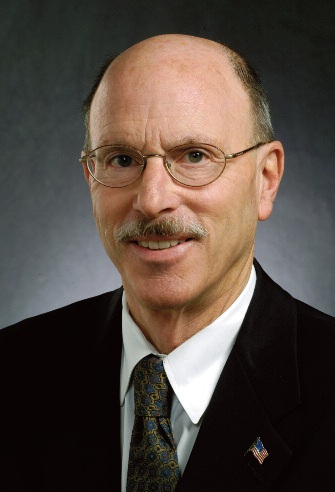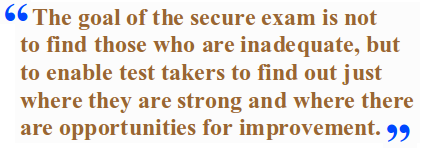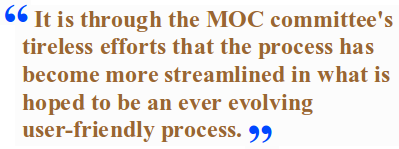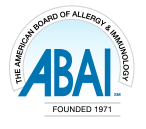President's Message: Stephen I. Wasserman, MD
ABAI's Secure Exam — Focusing Future Learning Efficiently and Effectively
by Stephen I. Wasserman, MD

I have just returned from a stimulating and important meeting held by the American Board of Medical Specialties (ABMS) focused on Parts II (Self-Assessment) and III (Cognitive Expertise) of the member boards' Maintenance of Certification (MOC) programs. Speakers with quite varied backgrounds (i.e., anesthesiology, internal medicine, infectious diseases, ophthalmology, and medical education) provided a wide perspective on where we are now and where we, as physicians dedicated to the improvement of performance in practice, need to be to optimally address the issues surrounding these two major components of MOC. We learned that physicians, like other professionals, are not particularly good at identifying our own areas of high knowledge and expertise or those areas needing improvement. It is a part of human psychology to overrate our abilities and performance. Additionally, we have learned that when medical errors under physician control are scrutinized, one of the most important deficits found is not knowledge per se, but in the ability to bring together disparate pieces of knowledge and to integrate them for example, to make a difficult diagnosis or prescribe a complicated regimen of care. Given this reality, what are the best strategies to help physicians identify areas of opportunity for improvement?
 Despite our personal inability to accurately identify areas of deficiency, it is still useful for us to work on those areas in which we do feel we are not up to speed. But to best supplement our own individual assessments what are good strategies for identifying gaps in knowledge or performance? One strategy is to engage in Part IV MOC activities designed to assess performance in practice. Individual performance in these exercises is then compared to that of our peers, and it rapidly becomes clear in which areas our performance needs improvement. Some issues identified are those of the systems in which we work, but some are clearly in domains under our control including knowledge of latest practices and best strategies to improve medical outcomes. An even more useful tool however is to engage in a comprehensive assessment of our base of knowledge—best exemplified by the secure examination (Part III of MOC requirements). We at ABAI recognize that this is a stressful and not widely beloved aspect of the MOC program but it is by far the best way for physicians to identify areas of weakness. The goal of the secure exam is not to find those who are inadequate but to enable test takers to find out just where they are strong and where there are opportunities for improvement. That is why the questions are purposely selected to be difficult. We at ABAI do know that everyone taking the examination has already passed at least two prior board examinations (their primary board and their initial ABAI certification examination) and has thus previously demonstrated an acceptable knowledge base. Therefore the passing score is set in recognition of this fact and it is possible for everyone to pass—there is no required failure rate. However, it is important to note that there is accumulating evidence that one's performance on such standardized tests deteriorates with time and that scores do drop over the lifetime of a physician. We continue to believe that by far the best use of the secure examination is to identify those areas in which knowledge base may have slipped, or to identify those areas in which one’s performance, although acceptable, is not on par with our professional peers. ABAI is developing a
Despite our personal inability to accurately identify areas of deficiency, it is still useful for us to work on those areas in which we do feel we are not up to speed. But to best supplement our own individual assessments what are good strategies for identifying gaps in knowledge or performance? One strategy is to engage in Part IV MOC activities designed to assess performance in practice. Individual performance in these exercises is then compared to that of our peers, and it rapidly becomes clear in which areas our performance needs improvement. Some issues identified are those of the systems in which we work, but some are clearly in domains under our control including knowledge of latest practices and best strategies to improve medical outcomes. An even more useful tool however is to engage in a comprehensive assessment of our base of knowledge—best exemplified by the secure examination (Part III of MOC requirements). We at ABAI recognize that this is a stressful and not widely beloved aspect of the MOC program but it is by far the best way for physicians to identify areas of weakness. The goal of the secure exam is not to find those who are inadequate but to enable test takers to find out just where they are strong and where there are opportunities for improvement. That is why the questions are purposely selected to be difficult. We at ABAI do know that everyone taking the examination has already passed at least two prior board examinations (their primary board and their initial ABAI certification examination) and has thus previously demonstrated an acceptable knowledge base. Therefore the passing score is set in recognition of this fact and it is possible for everyone to pass—there is no required failure rate. However, it is important to note that there is accumulating evidence that one's performance on such standardized tests deteriorates with time and that scores do drop over the lifetime of a physician. We continue to believe that by far the best use of the secure examination is to identify those areas in which knowledge base may have slipped, or to identify those areas in which one’s performance, although acceptable, is not on par with our professional peers. ABAI is developing a
 process by which we hope to convey to takers of the secure examination their own performance in multiple domains, and to compare that performance with all takers of the examination. In that way it should be possible to find areas of strength and relative weakness. Rather than criticize individual physicians for poor performance, it is the goal instead to help focus physician learning over the next few years of the MOC process on those precise areas identified as offering opportunities for improvement. Thus one should view the secure examination not as a summative exercise, reflecting the end of a process, but as a formative one providing insights for focusing future learning. In fact, in the future, it may well prove most efficient for our diplomates for the ABAI to offer the secure examination in the first 1-3 years of the MOC cycle rather than in years 8-10, to more effectively provide a platform for planning productive, self-directed learning for the rest of the MOC cycle. No such plans to alter the examination timing are now under consideration, but it is a topic which I personally would like to hear feedback from you, our diplomates. Again, we at ABAI acknowledge the stress of the secure examination, have set the pass score according to our recognition of prior examination passing performance and thus expect very high pass rates. However, we have made the difficulty of the examination questions such that we all can learn our strengths and weaknesses enabling us to best focus our self-directed learning efforts efficiently and effectively.
process by which we hope to convey to takers of the secure examination their own performance in multiple domains, and to compare that performance with all takers of the examination. In that way it should be possible to find areas of strength and relative weakness. Rather than criticize individual physicians for poor performance, it is the goal instead to help focus physician learning over the next few years of the MOC process on those precise areas identified as offering opportunities for improvement. Thus one should view the secure examination not as a summative exercise, reflecting the end of a process, but as a formative one providing insights for focusing future learning. In fact, in the future, it may well prove most efficient for our diplomates for the ABAI to offer the secure examination in the first 1-3 years of the MOC cycle rather than in years 8-10, to more effectively provide a platform for planning productive, self-directed learning for the rest of the MOC cycle. No such plans to alter the examination timing are now under consideration, but it is a topic which I personally would like to hear feedback from you, our diplomates. Again, we at ABAI acknowledge the stress of the secure examination, have set the pass score according to our recognition of prior examination passing performance and thus expect very high pass rates. However, we have made the difficulty of the examination questions such that we all can learn our strengths and weaknesses enabling us to best focus our self-directed learning efforts efficiently and effectively.
Please share your thoughts with me on this topic at abai@abai.org or swasserman@ucsd.edu
Notes from the Chair: John Oppenheimer, MD
ABAI: Striving to Make the MOC Process More Accessible
by John Oppenheimer, MD

The Maintenance of Certification (MOC) process is a professional response attempting to ensure physician accountability and transparency in the assessment of their professional development and education. To do so, the American Board of Allergy and Immunology (ABAI) relies upon the six core competencies developed by the American Board of Medical Specialties (ABMS) and the Accreditation Council for Graduate Medical Education (ACGME) which has been promoted through public pressure for accountability and credibility. These six core competencies include: patient care and procedural skills, medical knowledge, practice-based learning and improvement, interpersonal and communication skills, professionalism and systems-based practice. Since 1977 the ABAI has offered a recertification process. Although, initially a voluntary exercise, in 1989 the ABAI began issuing only time-limited certificates requiring MOC every 10 years. At first, our parent boards solely required taking a secure exam every 10 years to fulfill this commitment. Over time however, this program has evolved to require a continuous educational process. Currently, the ABAI has 5,480 diplomates. Of these, 2,297 (41.9%) have time-unlimited certificates (TUC) and 3,183 (58.1%) have time-limited certificates (TLC). To date, 48.2% of all diplomates
 are meeting MOC requirements. Of the diplomates holding a TLC, 67.3% are meeting MOC requirements while 21.8% of diplomates holding a TUC are meeting MOC requirements.
are meeting MOC requirements. Of the diplomates holding a TLC, 67.3% are meeting MOC requirements while 21.8% of diplomates holding a TUC are meeting MOC requirements.
To achieve this, the ABAI has implemented four components in the MOC process. These include: Part I Professional Standing, which includes medical licensure, updating demographic information, and an annual MOC fee; Part II which includes CME credits, a patient safety module once every 10 years, a communication module once every 10 years and a Recent Advances (RA) module once every five years; Part III is the secure exam and Part IV is one practice assessment/quality improvement module every five years. These components can seem somewhat overwhelming; however we are striving to make the process more accessible. This includes our recent revamping of the RA module, with the hope of it someday being integrated into our society's annual meetings. Likewise in the future, it is hoped that the Part IV component will be integrated into your electronic health record (EHR) program.
Orchestrating this process has been very labor intensive. To accomplish this task, the ABAI has developed an MOC committee, chaired by John James, MD. As a private practitioner, he is very cognizant of the constraints facing the practicing allergist. It is through the MOC committee's tireless efforts that the process has become more streamlined in what is hoped to be an ever evolving user-friendly process. As an example, diplomates will have a greater number of topic choices when completing a
 practice assessment/quality improvement module for MOC part IV. The newest module which is currently available for Part IV credit is the PI Pro: Food Allergy PIM. Dr. James will be transitioning off the ABAI Board of Directors in 2014 and his position will be filled by another practicing allergist, Stuart Abramson, MD.
practice assessment/quality improvement module for MOC part IV. The newest module which is currently available for Part IV credit is the PI Pro: Food Allergy PIM. Dr. James will be transitioning off the ABAI Board of Directors in 2014 and his position will be filled by another practicing allergist, Stuart Abramson, MD.
We at the ABAI continue to strive to improve the MOC process and encourage our diplomates to write or email the ABAI office with any suggestions to improve upon the process.
PI:PRO Food Allergy PIM now available to ABAI Diplomates
The Maintenance of Certification (MOC) Committee approved the PI:PRO Food Allergy Practice Improvement Module (PIM), sponsored by the American Academy of Allergy Asthma & Immunology (AAAAI) for MOC Part IV credit.
This activity will lead you through a three-stage quality improvement process. A baseline assessment, an action phase, and a reassessment. You must successfully complete the activity in its entirety, in order to earn both Continuing Medical Education (CME) credit and MOC Part IV credit. You should allow at least 60 days to complete the entire module. Please click here for additional information and to register for the PIM.
ABAI Enacts New Policy Regarding Time-Unlimited Certificates
In 2012, the ABAI established a formal policy for diplomates with a time-unlimited certificate participating in its Maintenance of Certification (MOC) program. Time-unlimited certificate holders have until December 31, 2013 to actively elect or decline to participate in the ABAI MOC program. This can be done by logging on to the ABAI Web Portal (http://portal.abai.org) and submitting the "Voluntary Maintenance of Certification for Time Unlimited Certificates" form. Upon agreement and submission of the form, you will be in year 1 of the ABAI MOC program and must complete the annual requirements by December 31, 2013 to be reported as "Certified, Meeting MOC Requirements". Diplomates with time-unlimited certificates who start the ABAI MOC program will then be expected to complete annual, five year, and ten year requirements of the ABAI MOC program by December 31st each year they are due in order to be reported as "Certified, Meeting MOC Requirements".
In an effort to allow sufficient time to complete and submit the "Voluntary Maintenance of Certification for Time Unlimited Certificates" form, ABAI will continue to report time-unlimited diplomates who are already participating in MOC as "Meeting MOC Requirements" through December 31, 2013. Starting January 1, 2014, diplomates with a time-unlimited certificate who have not submitted the form to start the MOC program and completed the annual requirements for 2013 will be reported as "Certified, Not Meeting MOC Requirements" with a disclaimer stating "MOC is voluntary for time unlimited certificate holders".
The ABAI MOC program is a voluntary process that provides board certified physicians a mechanism to demonstrate their commitment to high quality care within their specialty. While we encourage all diplomates to participate in ABAI's MOC program, it is voluntary for time-unlimited certificate holders. Participation in ABAI MOC will not affect time-unlimited certification status. If you have any questions about this new policy or ABAI MOC in general, please call or email the office. Our staff is here to help you understand and complete the ABAI MOC requirements.
ABAI adopts new Board Eligibility policy
In April 2013, the ABAI Board of Directors approved a new Board Eligibility policy with the following requirements:
Trainees must achieve ABAI Board certification within five years after successfully completing an ACGME-approved fellowship training program in Allergy and Immunology, which typically takes two-to three-years. For those who completed training prior to 2012, eligibility to sit for the certification examination will expire in 2017. If the trainee does not accomplish this certification, they will lose their status as "Board-Eligible" and they will be required to successfully complete, in its entirety, a re-entry pathway consisting of the following:
- An ABAI Communication Module
- An ABAI Patient Safety Module
- The Allergy and Immunology In-Training Examination
- Evidence of 50 Allergy/Immunology-specific CME credits per year
Note: Participation in an AAAAI/ACAAI-sponsored Allergy and Immunology Board review course is strongly recommended.
Once Board eligibility has been re-established, the candidate has three years to successfully pass the ABAI Certification Examination.
ABAI Staff Spotlight: Gina Capozzoli

Gina Capozzoli brought nearly 30 years of experience in medical practice management, customer service, and hospitality prior to joining the ABAI in 2008 as Administrative Assistant to ABAI's Chief Operating Officer, Lawrence Vapniarek. For the last five years Capozzoli has served the ABAI as a first point of contact for certification candidates and MOC program diplomates. In this role, she possesses a thorough knowledge of the examination process from registration procedures to fielding queries regarding results. Capozzoli wears many "CERT and MOC hats" which encompass the processing of certification exam applications, fees, and documentation. She guides diplomates through their individual 10-year MOC timeline parts I-IV requirements, while ensuring that all candidates possess accurate up-to-date credentialing and test site information.
Capozzoli represents ABAI 'on the road' at AAAAI and ACAAI meetings where she and ABAI staff have the opportunity to meet and assist diplomates and candidates first-hand with program queries and requirements. She's involved with the American Board of Medical Specialties (ABMS) Board Staff Conference as a member of the planning committee for the annual event. She also provides administrative and clerical support at ABAI annual Board of Director meetings where she assists with record keeping and event planning and coordinating.
FAQs — Participation in MOC
Why should I participate in MOC and what will happen if I decide not to participate in MOC?
In addition to the personal benefits of demonstrating one’s professionalism, commitment to lifelong learning and quality improvement needed to provide the highest quality Allergy and Immunology care, there are several other potential reasons why a Diplomate will want to participate in MOC:
- Patients and the public are more avidly seeking documentation that their physician is practicing the highest quality medicine, and for many stakeholders, board certification and MOC are becoming a measure of quality. If you choose not to participate you will be listed as not participating in MOC in the ABAI and ABMS databases.
- Insurers are looking at ways to identify "quality" providers and it is possible that reimbursement or carrier network participation could be tied to such defined quality in the future. The Blue Cross/Blue Shield Association has begun to emphasize participation in MOC to its members, and it is increasingly likely that participation in MOC will become a quality measure. Thus if you choose not to participate in MOC any such credits may not be available to you.
- State licensure boards are actively looking at Maintenance of Licensure (MOL) programs, and the ABMS and its member boards are working with the Federation of State Medical Boards to assure that participation in MOC will qualify for MOL.
- In certain states, malpractice carriers have already started to give discounted premium rates to physicians participating in MOC.
Read some fact sheets about the value of Maintenance of Certification, published by ABIM.
If I have a time-unlimited certificate will I lose my certification if I don’t participate in MOC?
No. MOC is a voluntary process for time-unlimited certificate holders. ABAI will not "revoke" a time unlimited certificate for failure to participate in MOC, however, beginning in 2011, the Diplomate will be reported in ABMS and ABAI databases as "Not Meeting MOC Requirements".
I’m nearing retirement and am not sure whether to participate or where to start the process?
The reasons to participate are listed above.
In order to start the process a Diplomate will need to formally start the MOC program by registering on the ABAI Web Portal. The individual’s timetable will show where in the process they are and what will be needed by certain dates.
Note at this time, that a time unlimited Diplomate who is participating in MOC will not have to sit for the secure exam until 2021, year 10 of the MOC cycle (or 2019 if they want to take it early)!
2012 Secure Examination Pass Rates
| Category | Number of Candidates |
Percent Pass |
| Certification | ||
| All candidates | 160 | 89% |
| First-Time Takers | 154 | 97% |
| Repeat Takers | 6 | 29% |
| USA/Canadian Graduates | 134 | 95% |
| International Graduates | 26 | 68% |
| ABIM-Certified | 88 | 89% |
| ABP-Certified | 67 | 89% |
| Both ABIM & ABP-Certified | 5 | 100% |
| Recertification (MOC) | ||
| All candidates | 129 | 98% |
| Time-Unlimited Certificate Holders | 1 | 100% |
| Time-Limited Certificate Holders | 128 | 98% |
Calendar — Secure Examination Dates
| 2013 | Event |
| January 1 | Exam Registration Opens |
| February | |
| March | |
| April | |
| May 1 | Exam Registration Late Fee Applies |
| May 31 | Exam Registration Closes |
| June | |
| July | |
| August 5 | Registration with Test Site Opens |
| August 31 | Cancellation Deadline |
| September 27 | Application Documentation Due |
| September 30 | Exam Start Date |
| October 4 | Exam End Date |
| November | |
| December 1 | Exam Results Released |
